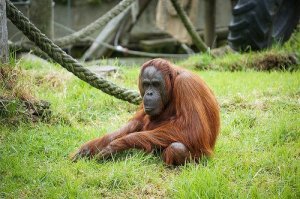What If We Don't Come from Monkeys?


Written and verified by the vet Eugenio Fernández Suárez
Is it true that we come from monkeys? Lots of people asked that question after Darwin presented his theory of evolution.
Darwin’s theory of evolution
It turns out that Darwin never said we come from monkeys. The theory of evolution challenged traditional creationism. In this theory, people believe that a divine being created everything we see today. There are many scientists even these days that believe this theory.
However, according to Darwin, living things adapted through different factors related to evolution. For example, one of those factors was natural selection.

In fact, that’s not the only thing. Darwin included human beings in his theory, and introduced the idea that we didn’t come from the hand of God. On the other hand, he claimed that we belong to an evolutionary lineage that went through a process. Specifically, Darwin wrote this down in The Origin of Species, one of his most famous books:
“We must, however, acknowledge, as it seems to me, that man with all his noble qualities… still bears in his bodily frame the indelible stamp of his lowly origin.”
-Charles Darwin-
Is it true that we come from monkeys?
Once we understand this theory, we see that, according to Darwin, we were living beings that had evolved from other beings. That is, he says that humans are animals, and, more specifically, primates.
At the time, the press and creation scientists mocked Darwin for the idea that we come from monkeys. In fact, they drew the famous picture of a gorilla with Darwin’s head. However, they seemed to misunderstand his theory in some ways.
Through fossil records, evolution deduces that our ancestors were primates for millions of years. In other words, they say that we don’t come from any of the current species of monkeys – but that we would share some sort of common ancestry. The older the animals, the greater the differences between us and them.
In this sense, evolution says that our common ancestor, the chimpanzee lived in Africa six million years ago. With the rest of the apes, like gibbons, the common ancestor is Alesi.
Through fossils, evolution deduces that our ancestors were primates for millions of years.
Evolutionary tree
It doesn’t hurt to remember that evolution is a tree. In fact, Darwin represented this in his first illustrations through phylogenetic trees. The branches evolved equally, but some are more similar to others.

In this way, we share branches with animals that are most similar to us. Then, the branches separate. Alesi separated 13 million years ago, and chimpanzees six million years ago. However, this goes against the image lots of people have, where they see evolution as a ladder.
Evolution isn’t a ladder, with orangutans or bonobos a few steps below us. This vision could cause people to think less of monkeys. This could even cause some species to become extinct.
All animals are equally evolved, although each one has adapted to a specific ecosystem and functions. In other words, humans can’t survive where dolphins, bacteria, or Bengal tigers do.
Remember, evolution describes itself as a tree that welcomes us all. In fact, our feelings, thoughts and everything that makes us human can also be reflected in animals.
Is it true that we come from monkeys? Lots of people asked that question after Darwin presented his theory of evolution.
Darwin’s theory of evolution
It turns out that Darwin never said we come from monkeys. The theory of evolution challenged traditional creationism. In this theory, people believe that a divine being created everything we see today. There are many scientists even these days that believe this theory.
However, according to Darwin, living things adapted through different factors related to evolution. For example, one of those factors was natural selection.

In fact, that’s not the only thing. Darwin included human beings in his theory, and introduced the idea that we didn’t come from the hand of God. On the other hand, he claimed that we belong to an evolutionary lineage that went through a process. Specifically, Darwin wrote this down in The Origin of Species, one of his most famous books:
“We must, however, acknowledge, as it seems to me, that man with all his noble qualities… still bears in his bodily frame the indelible stamp of his lowly origin.”
-Charles Darwin-
Is it true that we come from monkeys?
Once we understand this theory, we see that, according to Darwin, we were living beings that had evolved from other beings. That is, he says that humans are animals, and, more specifically, primates.
At the time, the press and creation scientists mocked Darwin for the idea that we come from monkeys. In fact, they drew the famous picture of a gorilla with Darwin’s head. However, they seemed to misunderstand his theory in some ways.
Through fossil records, evolution deduces that our ancestors were primates for millions of years. In other words, they say that we don’t come from any of the current species of monkeys – but that we would share some sort of common ancestry. The older the animals, the greater the differences between us and them.
In this sense, evolution says that our common ancestor, the chimpanzee lived in Africa six million years ago. With the rest of the apes, like gibbons, the common ancestor is Alesi.
Through fossils, evolution deduces that our ancestors were primates for millions of years.
Evolutionary tree
It doesn’t hurt to remember that evolution is a tree. In fact, Darwin represented this in his first illustrations through phylogenetic trees. The branches evolved equally, but some are more similar to others.

In this way, we share branches with animals that are most similar to us. Then, the branches separate. Alesi separated 13 million years ago, and chimpanzees six million years ago. However, this goes against the image lots of people have, where they see evolution as a ladder.
Evolution isn’t a ladder, with orangutans or bonobos a few steps below us. This vision could cause people to think less of monkeys. This could even cause some species to become extinct.
All animals are equally evolved, although each one has adapted to a specific ecosystem and functions. In other words, humans can’t survive where dolphins, bacteria, or Bengal tigers do.
Remember, evolution describes itself as a tree that welcomes us all. In fact, our feelings, thoughts and everything that makes us human can also be reflected in animals.
This text is provided for informational purposes only and does not replace consultation with a professional. If in doubt, consult your specialist.








